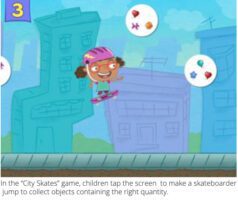Could tablets be the key to unlocking a lifetime of deep mathematics learning for preschool children? The very question is controversial—and yet potentially very important. Math is rarely taught in preschool and when it’s taught, lessons tend to focus only on counting. However, when preschool children receive strong preparation in mathematics, the benefits—especially for children from poorer households—can be dramatic and long-lasting. Research has shown that early math skills can be a strong predictor of later academic success.

Most of today’s tablet software falls short of delivering what preschool teachers and students need. Building on strong learning science principles and rigorous empirical research, a new project at SRI is shedding light on the learning technology design principles that could underlie a breakthrough in early mathematics development for all, and especially those who need the most support in their critical early years. Unfortunately, many children, especially those most at-risk for poor math performance, are not exposed to the relationships between these simple skills and their mathematical meanings (for instance, they may not recognize how counting is related to quantity).
To help remedy this situation, we are working on Next Generation Preschool Math (NGPM), a four-year National Science Foundation (NSF)-funded project, which was recently highlighted in a New York Times article. Educational researchers from SRI and EDC are collaborating with educational media designers from WGBH to develop materials comprised of tablet-based apps and non-digital activities that are integrated with teacher professional development.
A critical aspect of NGPM is investigating how digital resources can be effectively integrated into a suite of preschool resources. As learning games for young children are very popular in the iPad app store, we first investigated the characteristics of a sample of these games, and we found several common weaknesses. The games tended to lack a trajectory of math learning; most tablet-based games are designed for use at home or in the car—not for the preschool classroom; and most games are designed to be “stand-alone” and are not part of a suite of resources that can be used to link learning in digital and non-digital contexts. We have designed our materials to be based on an explicit learning trajectory, to leverage both digital and non-digital materials, to link to the real world, and to incorporate the constraints and opportunities found in the preschool classroom.
Foundational Math Skills
The materials focus on two topics: subitizing and equipartitioning. These two topics typically receive little attention in preschool, but provide foundational skills important not only academically, but throughout life. Subitizing is the ability to quickly determine the number of objects in a group without counting, such as the number of dots on a dice. This skill is key to understanding the notion of number and quantity. Equipartitioning is the ability to create equal-sized groups of objects or equal-sized parts of one object, such as sharing a pizza equally between friends. It is essential in understanding rational numbers, fractions, division, and ratios.
For each math concept, we created a set of detailed learning goals, which were then used by media designers to develop instructional games. For instance, in a digital subitizing game, groups of objects move across the screen, and when the child taps the screen a skateboarder jumps and retrieves collections containing the target quantity. As the children become better at subitizing, the quantities and arrangements become more complex. In a game designed to foster collaboration, each child controls one side of a jump rope that can be used to pop (or avoid) bubbles containing groups of objects. Children talk to each other as they play and decide which bubbles to pop and which to let pass by, depending on the quantity in the bubbles.
We are also designing non-digital materials, including read-aloud books, board games, and snack time and playground activities. These activities link the learning in the digital games to the “real world” and provide a basis for discussing how math can be found throughout the day.
NGPM also focuses on professional development for preschool teachers. Most preschool teachers have had limited exposure to technology or limited experience teaching advanced mathematics. Not only do we help teachers understand the mathematics and the technologies, we provide videos of the use of the materials and support teachers in using the materials in the professional development sessions. And, of course another benefit of integrating the activities into familiar preschool routines is that teachers can use what they already know about preschool teaching.
We look forward to sharing more in the near future, as we head into the classroom and report on how preschoolers and teachers are embracing NGPM.


